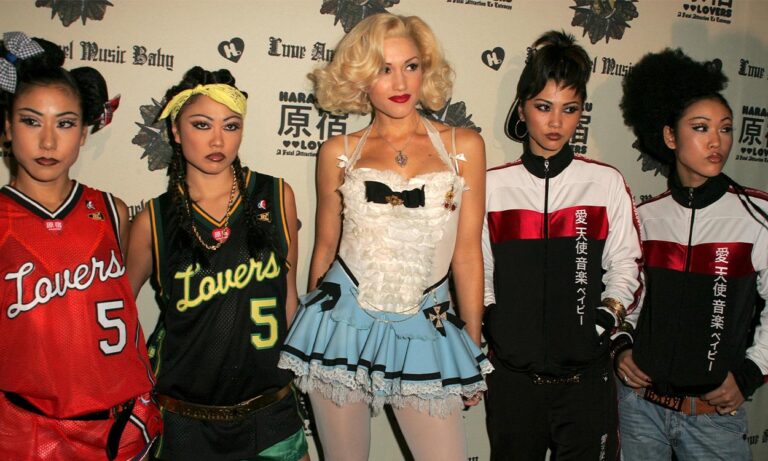Why is Gwen Stefani refusing to apologise for her highly problematic cultural appropriation?
Synonymous with female attitude, bleach blonde hair, and distinctive fashion choices, Gwen Stefani made a name for herself in the mid-90s by mixing real-world emotions with impactful societal commentary—all bundled together into a spunky and memorable mantra: “I ain’t no hollaback girl.” Once considered an icon of female resistance, the curtain is now falling on Stefani’s popularity after over a decade of questionable artistic choices and, more recently, her controversial statement, “I’m Japanese.”
For those of you who aren’t familiar with the singer’s career, Stefani started out as the lead singer of ska punk band No Doubt alongside her brother Eric and other bandmates. The group achieved massive mainstream success in the 90s, releasing hits such as ‘Just a Girl’ and ‘Don’t Speak’—the latter of which is still a cult favourite among angsty gen Zers.
For a very long time, the lead singer garnered attention from mainstream publications, as well as smaller indie movements, due to her originality and unwillingness to conform. It was artists like Stefani, Avril Lavigne and Pink who championed the alt-girl attitude—rejecting stereotypically feminine aesthetics and instead sporting more ambiguous and low-key looks. This kind of fashion activism stood up in stark comparison with the hyper-girly approaches taken by pop stars like Britney Spears and Natascha Bedingfield.
Even in 2021—over 20 years after the punk singer first gained notoriety—Vogue published a lengthy lookbook praising Stefani’s effortlessly chic tomboy aesthetic. Of course, the influential fashion magazine also happened to conveniently leave out all of the highly problematic cultural appropriation that consumed Stefani’s public identity for the better part of a decade.
It seems Stefani’s been lugging around a hell of a lot of baggage for the duration of her 30-year-long career and the thread is finally beginning to unravel. Let’s unpack all of the most significant chapters of this singer’s story.
Gwen Stefani’s Harajuku era
Stefani began to pursue a solo career in the early 2000s and practically overnight, it became apparent that the white American artist had a deeply problematic fascination with Asian culture. It’s important to note that the mainstream media were not having in-depth conversations about cultural appropriation in the mid-2000s—even now it’s a highly contested topic. So, when white celebrities donned bindis, wore saris on the red carpet and commandeered entire cultures as part of a marketing campaign, they were deemed global visionaries and progressive pioneers.
Now, of course, we’re far more educated about these topics and so we can revisit past instances where egos should’ve been checked and celebrities held to a higher standard in regard to cultural sensitivity and respect. With that in mind, back to the Sweet Escape singer.
In 2004, the artist released her debut solo album Love.Angel.Music.Baby, and kickstarted the promotion by centring the optics of the record’s entire theme and identity around Harajuku culture—a Japanese movement which celebrates bold, colourful and striking aesthetics.
Seemingly intent on appropriating the culture as her own, Stefani began to eat, sleep and breathe Harajuku. She started to travel with an entourage of four Japanese and Japanese-American backup dancers who were commonly referred to as her ‘Harajuku girls’, and even went as far as to design an extensive range of perfumes—titled, you guessed it ‘Harajuku lovers’—modelled off of the subculture.
Aptly put by Vice, the fact that the backup dancers—who were required to speak exclusively in Japanese when in public—became the focal point of Stefani’s breakthrough career speaks volumes to not only her own missteps, but how the entire industry and fanbase allowed her to get away with it. In no way was the singer’s reputation damaged or hindered by this. In fact, she went on to have an illustrious music career and even participated in three seasons of popular TV show The Voice. Did I hear someone say white privilege?
The delusion is real
I think the most upsetting and significant aspect of this conversation is the fact that still today, Stefani appears completely delusional about the harmful ways in which she utilised another culture’s aesthetic and tradition in order to further her own financial and commercial success.
In a recent interview with Allure, the artist was questioned about her Harajuku era. When explaining her attraction to Japanese culture, she stated, “It was so rich with tradition, yet so futuristic [with] so much attention to art and detail and discipline. It was fascinating to me.”
Cultural appreciation is one thing, but what she said next is a completely different story. The singer went on to unequivocally exclaim: “My God, I’m Japanese and I didn’t know it.” The interviewer, who is Filipina American, noted how she felt “the words hang in the air between us.”
The artist wasn’t finished, of course, concluding her point by saying: “If [people are] going to criticise me for being a fan of something beautiful and sharing that, then I just think that doesn’t feel right. I think it was a beautiful time of creativity… a time of the ping-pong match between Harajuku culture and American culture. [It] should be okay to be inspired by other cultures because if we’re not allowed then that’s dividing people, right?”
Rather than taking any accountability whatsoever, Stefani seemed completely hellbent on justifying this era in her life—even going so far as to seemingly criticise those who were going against her narrative.
It’s not the first time, nor can I imagine it’ll be the last, that white celebrities—or people in general—have profited off of the culture of people of colour. And despite public discourse and discussion being a valuable tool in regard to rewriting the court of public opinion, it doesn’t do a hell of a lot when the public figure in question refuses to apologise.






